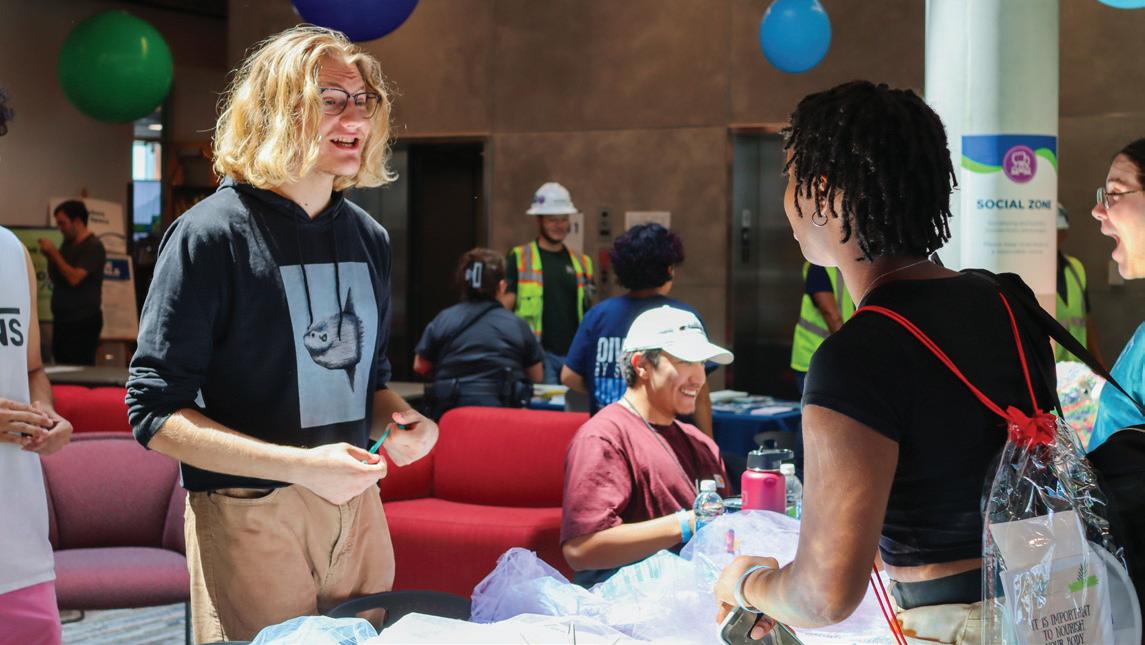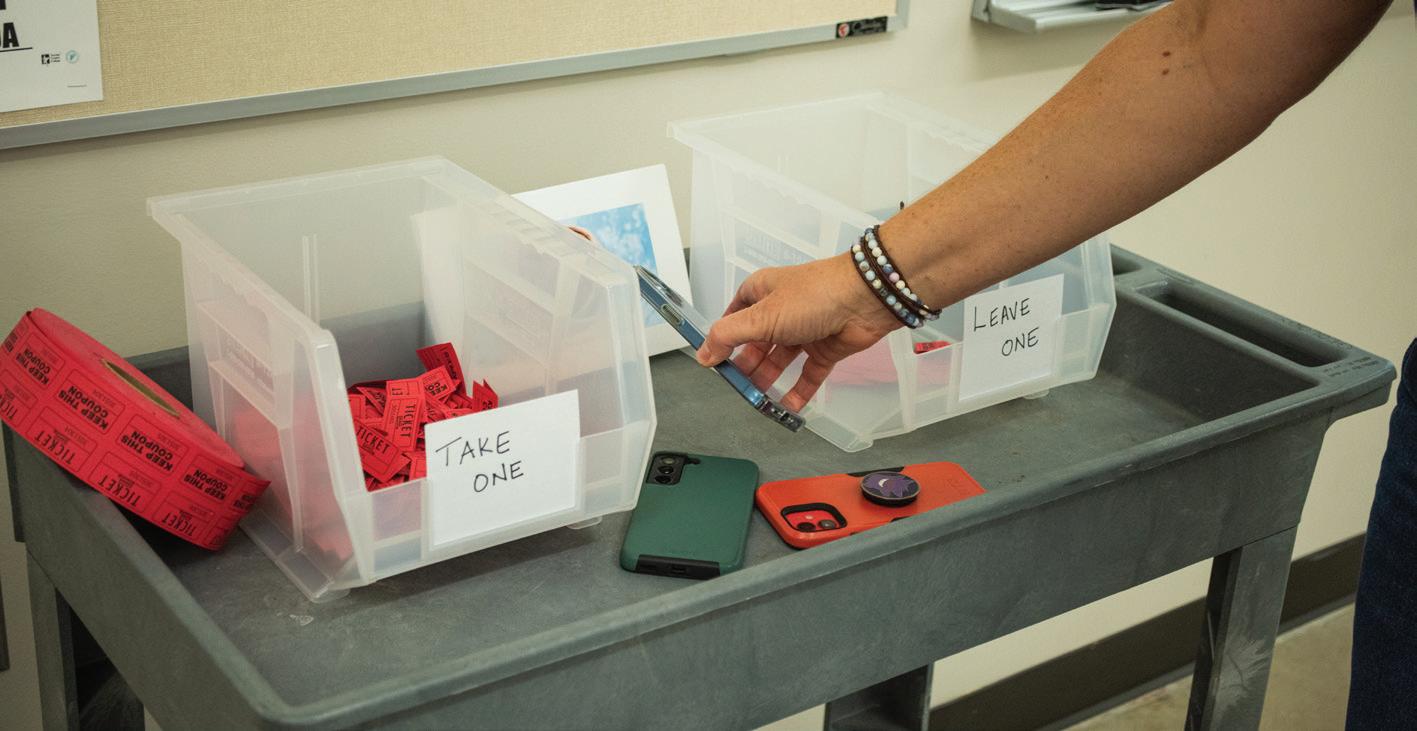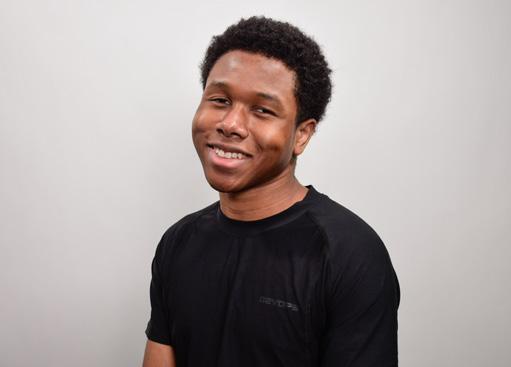Sexual assault reported
Victim alleges attack in north parking lot
HOPE SMITH editor-in-chief hope.smith393@my.tccd.edu
Police are investigating an alleged sexual assault that occurred on the second day of the semester on NW Campus.
The assault occurred Aug. 22 between 7 and 8 a.m. in the north parking lot, according to an email sent by police districtwide.
In the email, the suspect was described as a white male, blonde with blue eyes and wearing shorts. His car was described as a small blue vehicle, possibly a van.
An open records request for more information was denied by TCC Public Information Officer Keith Whetstone because the investigation is ongoing.
Some NW students are uncomfortable with a report so early in the semester, including NW student Sydney Ellis who said they were worried.
“It’s kind of scary,” they said.
However, Ellis was comforted by the fact that police stationed their cars outside the NW05 building, which faces the north lot. They also felt it was good to know the police academy was training across the way.
“That’s kind of comforting, that they might not be police yet, but they’re training,” they said.
An email notifying TCC of the report was also helpful to Ellis because of the details on the suspect’s appearance and what car he drove.
Another NW student, Quin Roads, said she believes it is shocking that it happened with the number of police present.
required to report a sexual assault that is brought to her attention. Therefore, she always discloses to students that she must report any statement made. She has made one report in her time at TCC.
Staff members are required to take training on reporting sexual assault under Title IX, which prohibits sex-based discrimination in an educational program that receives government funding.
NW student Angel Jassl believes that though NW Campus likely has its blind spots, he feels relatively safe there. However, with campus under construction, he does not know if there are directions stating a place to report at.

“I’m sure they have signs, but it’s not like you know where to go,” he said.
“With them being around, I wouldn’t think that would happen,” she said. “But it happens.”
Despite Ellis’ sentiment on the police presence, they feel more comfortable going to a staff or faculty member to report on incidents of sexual assault.
“Due to past situations, I’ve never really been comfortable talking to police in general,” they said.
Jonnie Hazen, NW administrative assistant of mathematics and science, said she feels absolutely safe on campus and sees campus police every day.
As a faculty member, she is
Why top students chose TCC over four-year college
Ellis has classes that stretch into the evening, and they acknowledge the danger of walking alone after dark.
“I do have to call my friend whenever I’m walking because I don’t want to get snatched,” they said.
Campus resources like police are available to help with escorting by calling (817) 515-8911 and requesting an officer escort. Blue telephone boxes are stationed around campus accessible in case of emergencies, and anonymous reporting is available online.
Dancing with delight
 NINA BANKS campus editor nina.banks@my.tccd.edu
NINA BANKS campus editor nina.banks@my.tccd.edu
NE student Mimi Nguyen was poised to attend a top-ranked four year university.
In 2022, she was ranked 11th in a graduating class of 500. She participated in marching band and art, even making state two years. But Nguyen has found her community at TCC.
“I’ve made a lot more new friends outside my past circle,” Nguyen said.
There is a stigma surrounding the type of students who attend community college, and that deters many from applying to schools like TCC. For Nguyen and NE student Amy Ponce, attending a two-year institution seemed even more unusual because they graduated top of their class. Nguyen debated on going to a four-year institution. However, TCC remained a top choice.
“TCC was always in the back of my mind,” Nguyen said. “In general, I was very dismissive of going to a four year.”
Nguyen applied to Ivy League schools through QuestBridge, a nonprofit designed to bridge the gap between low-income and first-generation students to college, but was rejected.
“I [thought] this [was] a sign that TCC is probably what I should go with,” Nguyen said. When she told people about her decision, they were confused. The most memorable reaction came from her government teacher.
“He was super surprised,” Nguyen said. “He was just like, ‘Why?’I don’t want to pay thousands of dollars to go to school and I just think that I should slow down and start with TCC.”
For many students, community college is an opportunity to pursue an education at a low cost at their own pace. This belief is not lost on Chad Wooley, department chair of history, government, philosophy and legal studies at TR.
“ If I was to guess, cost is a big thing, proximity to their home, things like that,” Wooley See Top Student, page 2
Professors attempt to address issue of phones in classroom
KEYLA HOLMES campus editor keyla.holmes@my.tccd.edu
Professors at TCC are attempting to tackle the issue of students using phones during class lectures, some by enacting penalties and others by awarding prizes.
SE Geology Instructor Samantha Caputi said phones, or technology in general, bring a challenge to the classroom. For Caputi, there is a clear correlation between student success and phone use.
“Students who are always on their devices aren’t able to fully engage in class, and tend to not do as well as the students who can ignore their device.”
NE Public Speaking Instructor Jamie Kerr said when appropriately used in a class setting, phones can be an asset.
“Is there a place for them in the classroom?” she said. “Absolutely. There’s all kinds of ways we can harness technology. People essentially have a little computer in their hands that can be used for researching or other helpful methods.”
However, Kerr said when it comes to listening, devices can act
as a noise that not only affects the person utilizing the technology, but those around them.
“Not only is it distracting for them, but they’re communicating to the teacher, group members, or whoever may be speaking that something else is more worthy of their attention, and I think that’s harmful,” she said.
She teaches public speaking, a class that requires students to stand in front of their peers and present. In this space, being a supportive audience member sends positive nonverbal messages to a classmate.
“Students start the semester with the full amount of ‘audience etiquette’ points, and lose points only when they engage in one of the behaviors that we decided was disrespectful or unsupportive,” she said.
Kerr said most students want to be attentive and supportive, but aren’t aware of the nonverbal messages they’re sending. Deducting points for audience etiquette helps reinforce the importance.
Problems arise for Caputi when students use their phones to scroll through social media
See Phone, page 2
Wednesday, September 6, 2023 – Volume 37 Issue 3 @tccthecollegian • collegian.tccd.edu Parent/child relationships - The effect of living in a parent’s shadow Page 4 Sensationalism Journalism is beginning to lose focus on the importance of news Page 3 WhatsApp U.S. intelligence disbanded after WhatsApp scandal reveals spies on migrants Page 2 Young adulthood The experience of growing up as a young adult while living in your own head Page 3 NORTHWEST
Ariel DeSantiago/The Collegian NW students visit tables during Northwest Fest, an event held in NW05. The event featured dancing, food and music.
Alex Hoben/The Collegian NE ESL student Rocio Arnett performs on stage during NE’s Club Rush. The dancer got on stage in traditional attire and performed a short routine to the applause of the room.
I do have to call my friend whenever I’m walking because I don’t want to get snatched, Sydney Ellis NW student
DISTRICT DISTRICT
WhatsApp spies raise security concerns

prevent any violations of privacy as well as avoid law breaking.
Gov. Greg Abbott’s Texas National Guard intelligence wing has been disbanded following an incident involving a popular messaging app.
A handful of intelligence wing officials had taken part in an undercover surveillance mission to spy on migrants in Mexico through the use of “WhatsApp,” a free text, voice and video chat app. TCC campus-goers shed some of their concerns and knowledge regarding privacy violations and what they could mean for the state.
According to the Texas Tribune, the reason the intelligence wing was disbanded was because National Guard leaders “believed it violated long-standing rules against state-run spy operations.” The Tribune also stated that “another team from the intelligence directorate [board of directors] allegedly sent classified FBI intelligence to their Texas National Guard colleagues in an apparent violation of federal secrecy laws.”
NW Campus adjunct government professor Vincent Giardino said regardless of what the platform in question is, whether digital or not, state officials should be required to follow a certain set of guidelines in order to
Top student
“Whether it is a text message or a handwritten letter, the Constitutions and laws of the United States and Texas require officers to follow specific rules to obtain and use private information,” Giardino said. “Violating these laws means they cannot use the evidence in court. Officers cannot break the law in order to enforce the law.”
NE Campus student Khari Pollum said the operation was a cause for concern and felt as if the Republican Party was to blame. He also found that the way the intelligence officials went about approaching their surveillance operation to be a violation of human rights as well as a threat to the freedom of the people.
“As an institution, the Republican Party is comfortable operating in ways that blatantly appeal to fascism, in a manner everyone should be aware of and concerned about,” Pollum said. “If they can justify violating a group of people’s rights and privacy with their politics, and get away with doing so, not a single group of people can claim they live in a free land.”
Giardino shed some further light on what sort of precautions law enforcement should and should not do if something similar to the WhatsApp surveillance operation were to occur again in the future. He explains what he
(continued from page 1)
believes should be more common knowledge in the hope that students will be able to use the advice to steer clear of potential privacy violations.

“During an investigation, police officers do not need permission to access open social media accounts and use anything the public can see to build their case,” Giardino said. “But for everything else hidden from the pub-
lic, such as information about private messages or log-in information, police or prosecutors must justify their need for the information to get a warrant or a grand jury subpoena (a written order that requires a person to attend court) and force the company to provide the hidden data. At the state-level, this warrant can only be obtained from an elected judge.”
said. “It’s an opportunity to pick up your core classes and learn quite a bit at a reasonable cost. So I think a lot of students don’t want to get in that student loan debt that can happen starting at a four-year college, so they make great choices.”
That sentiment was the pull factor for Ponce. Like Nguyen, she graduated near the top of her class at 31 of around 500 students. Her family history motivated her to come to TCC. Her sister had attended TCC and transferred to the University of Texas at Arlington.
“I guess there was a big influence from my sister and my parents to tell me to do the same thing,” Ponce said. “Regardless, I ended up deciding ‘Well I might as well do the same thing.’”
As a first-generation student, Ponce appreciated the ease of TCC’s application process.

“TCC wasn’t really hard to apply to or figure out how to do it,” Ponce said. “It was the easiest thing. Going to a four-year will probably require more. It’s more complicated.”
NE dance club members take to the stage during the Club Rush event held on Wednesday, Aug. 30. The students did routines as well as group dances.

FOR $0 FROM MATH CLASS TO THE MALL
The social phenomenon of FOMO, the fear of missing out, is common in commu-
Phone
nity college. Watching peers experience the traditional university life may illicit feelings of sadness or regret about their choice.
Nguyen’s solution to alleviating FOMO: Get involved.
“Join organizations, join clubs, get to know people here as well as faculty, and that feeling will go away instantly,” Nguyen said. “You get to know so many great people who are in different stages of their lives, but with just as much passion as you would expect from college students across the nation. It’s no different here.”
Nguyen hopes the opinion of others or presumptions don’t discourage students from attending.
“You won’t get over the fear of missing out for a really long time,” Nguyen said. “And the feeling of being uncomfortable with people asking you why you’re wasting your ‘potential.’ You’re going to be really uncomfortable with that for a long time. But you just have to remember that at the end of the day nobody should care. And if they care, they’re actual losers.”
(continued from page 1)
or respond to non urgent text messages during class.
“I’ve had students admit to me that they are addicted to their phones and are unable to put them down for the length of a class,” she said. “They know that it hinders their learning and yet they still cannot resist the temptation to look at it during class.”
Unsure of what to do, Caputi is trying out a new method this semester to tackle the issue of phones during lectures.
“I decided for each class period that students decide to put their phones on a cart in front of class, they’ll receive a raffle ticket,” she said. “Periodically, I will draw a ticket or two from the bowl and give away small items such as candy, small mineral crystal samples, gift cards, and more.” So far, her method has been making an impact.
“I honestly didn’t think students would be interested in this system, but they’ve surprised me,” she said. “Each class there are at least twelve students who willingly put their phone up.”
Caputi will have a drawing at the end of the semester for larger prizes. Even if it only helps out one or two students, she said it’s worth it.
Aside from prizes or an award system for distancing oneself from their device, NE student Michelle Sheng said an incentive to put devices away is that classes aren’t free.

“You’re paying money to attend
these classes, so you shouldn’t be on your phone if you want to get as much as you can out of the class,” she said.
It may be hard to check something on a device and then put it away. For Sheng, she normally spends more time on her phone than initially intended.
“We all know the ‘I’ll just check something on my phone for two minutes, and then you go down fifty rabbit holes, and it’s five hours later,’” she said.
Even if students are able to quickly check something and then put their phone away, Sheng said it takes time to get back on task.
“Whenever we put our phones down we still tend to think about whatever text we just read or whatever we just saw,” she said. “It takes time to regain focus.” In regards to safety concerns, Kerr said having a phone close by works in the case of an emergency.
“I think a phone that I can grab to dial 911 in the case of an emergency or the campus police is super helpful, but I think that can happen when my phone is out of my hand and in close reach.”
For those who struggle with taking time away from their device, Sheng said you can practice detachment outside of class.
“You can say ‘okay, I’m going to set a timer for 20 minutes and I’m not going to look at my phone,’ she said. “The more comfortable you get, you can just add more time.”
2 • Wednesday, September 6, 2023 NEWS No matter how you crunch the numbers, students ride FREE on all Trinity Metro buses, TEXRail, ZIPZONE, and TRE to CentrePort Station. All you need is your TCC student ID! Learn more at RIDETRINITYMETRO.org/TCC
Alex Hoben/The Collegian
The WhatsApp Messenger App, according to The Texas Tribune, was used by members of the Texas National Guard intelligence wing to spy on migrants.
XAVIER BOATNER campus editor xavier.boatner@my.tccd.edu
Alex Hoben/The Collegian
Alex Hoben/The Collegian Geology instructor Samantha Caputi offers students to put their phone down in return for a ticket used in a end-of-class drawing.
Media is taking a dangerous turn for clicks
The special pleasure of being in student media is watching and learning from big name newsrooms around the world while silently taking note of responses to certain stories and applying it to practice.
Because of that, it is important that now, more than ever, student media and professional media have to start taking a serious look at the news they are distributing.


The internet has made news accessible at the click of a button. Right now, news distribution is circulating in everyone’s back pocket at a constant flow and rate.
In a Pew Research study, it stated Facebook far outpaced any other social media in terms of news distribution. Around 31% of U.S. adults said they got their news from Facebook. That’s how easy it is to find a news story.
The question that struck the newsroom was how they were going to make their story the one that crosses the screen first?
Well, there were some solutions. And, in a time where the media’s business model was crumbling with reporter staff cuts to leave half an office empty, coming out on top was not optional.
So attractive, bold headlines dance across the blue light screen promising more information on the personal lives of influencers.
Consumer eyes slowly glossing over, they could now learn more about the morning ritual of an actor, tap to follow the drama between two
VIEWPOINTS
famous individuals or try to find out what the little red circle is zooming in on a random spot of a photo with the caption, “You won’t believe
what this is!” It’s sad to see, because this is likely not what anyone in the news wanted.
To be clear, the media is not
evil. The goal is to keep the public properly informed on topics they don’t know about in their day to day and hold people in
power accountable. However, the transitional period that media is in now creates a riff in priorities.
Well after the birth of the internet, news outlets are prioritizing one story after another.
The world saw it with the submarine full of billionaires and the weeks that followed neglecting to acknowledge that at the same time, a refugee boat had capsized. It puts into perspective where the attention and care were paid.
What does this mean for consumers?
It could mean engaging. The media wants to know what its consumers did or did not enjoy to better curate content. It reflects the clicks. Opening a conversation is important to connect with media, too.
How does the newsroom respond to the push and pull of demanding media and news?

An option is bringing change with them and holding others accountable. Media does not have to always struggle. Journalists pave the path for others. It has to be like that.
This also means pushing against the norms set by older newsrooms. Members of the news must challenge what others believe is the way things must be.
It is a tricky situation, but it is not unmanageable. There is value in news and reporting. When done properly society is better informed to make decisions that are beneficial and nurture the success of humanity.
XAVIER BOATNER campus editor xavier.boatner@my.tccd.edu

Being a young adult in 2023 is confusing. As a result, lots of people may prefer to find some sort of solace in their own safe spaces.
When the going gets tough, people tend to go to a place that makes them feel comfortable. Whether that comfort is achieved by reading a favorite book, watching a favorite show or movie, playing a favorite game or indulging in a favorite food, everyone has a special retreat.
This is normal of course, and it’s a valid and usually reliable way to feel safer from the harsh realities of the state of the world at large or just a hectic personal life. But in the end, I feel like it’ll only do more harm than good, specifically depending on the kind of comfort people are taking solace in.
For me, when the going gets tough, I go where no one else can: my head.
And for the most part, it’s usually pretty great! Until it isn’t. So much daylight has been wasted while I’m held prisoner in my own fantasy world of “could haves,” “would haves,” “should haves” and “can be’s.” And it’s usually pretty great – sometimes.
With each passing day, the impact of growing up as a sheltered kid beats me over the head more and more, and it’s gotten to a point where I feel so uncertain of how life
is supposed to play out. There are so many days – too many days – where all I can think to myself upon waking up is, “Am I doing this right?” And it’s so exhausting. It’s all so confusing.
That aside, why do people spend time in their heads to begin with? Chances are it’s complicated and different among different people (as many things are) so there’s no exact answer, but there are always underlying reasons as to why people may be feeling this way.
Growing up as a Black guy, I was under the impression that Black boys were supposed to listen to certain music, dress a certain way, talk a certain way, look as tall as Black NBA all-stars, be as funny and talkative as Black comedians – and none of that was me.
I always felt like I came out wrong. I always thought that eventually, one day, I’d finally grow to be the kind of person I thought people expected me to be. But that day didn’t come. It hasn’t come. And after extensive research, I have concluded that it will not. Bummer.
That’s why I waste so much time in my mind. It’s a place where I don’t have to compare myself to others or feel guilty for existing. But that needs to stop. It’s not healthy. And it won’t accomplish anything in the long run.
This isn’t written to be the most deep, philosophical, world-shattering, universeunraveling piece of work any undergrad has ever had the privilege of laying their precious little eyes on (or big eyes since The Collegian doesn’t discriminate). Instead, just a little glimpse into the mind of some run-of-the-mill TCC student, desperately hoping that some other student may read this and relate and know that they aren’t alone.
OLLA MOKHTAR campus editor olla.mokhtar@my.tccd.edu
I was half an orphan graduating high school and I’ll be half an orphan when I graduate college.
I’ll be half an orphan celebrating and half an orphan crying. Either way my reaction to the fact that one of my parents isn’t here with me anymore has warranted interesting opinions. Namely, why don’t they understand how people navigate life without the people who created you.
During my second semester of my junior year, I was taking an AP Biology exam, one I had been preparing for weeks. During lunch, I was going over the Krebs cycle, again.
Right before I sat down my sister told me her best friend was hysterical and was crying, I knew it was something to do with my mother.
I was right, after a year of battling cancer, it had finally won.
Imagine having to deal with that and the fact that some people said “Oh, I don’t know what I would do without my mother.”
Granted, I wanted to do was scream “Neither do I ma’am, are you that insensitive?”
The reason it was insensitive and rude was because I had actually lost my mother. It wasn’t hypothetical to me, it was my reality. Saying that will only remind the person affected by the tragedy that they have to
navigate life differently from the first decade and a half of their life.
My other qualm about having to grieve my mother was the number of aunties that said they would now be my mother. I’m going to break the fourth wall again and say if I could write a bunch of question marks, trust me I would. Blame AP Stylebook, not me.
Again, I’m sure they were just trying to be nice, but did they ever think that anyone would replace their mother? Chances are the answer is no.
I was 16 years old, very confused, heartbroken and felt utterly alone because I was young. I had barely lived and someone pivotal to my life experience was gone.
Of course, I was crying, of course I was devastated. I’ve dealt with loss before but because I wasn’t close with them I didn’t feel the full effect of their losses, so of course my mothers was different.
On top of that, this was before quarantine. You may be thinking well, what about your other parent?
Suffice to say I’m just not close to him, my parents are immigrants and sometimes immigrant parents have a disconnect with their children that were born in America. For instance, after my mother passed away, I decided to talk to my counselor because I needed someone to talk to. Naturally they told my father and when he told me about it, he was angry simply because I spoke to someone after a traumatic incident.
When someone is trying to move on with life due to a loss they probably don’t have the energy nor the desire to respond to inappropriate ways of saying their sorry for your loss.
Since saying “I’m sorry for your loss” is an actual term, how about we stick to that, yes?
Chris Whitley Lori Dann PRODUCTION MANAGER Stacy Luecker
The Collegian is a weekly student publication serving the Tarrant County College District. Editorial statements and advertisements do not necessarily reflect the opinion of the TCC administration. Letters to the paper should be 150 words or less, free from libel and poor taste and include the writer’s Colleague ID or telephone number (the numbers will not be published). Letters may be brought to The Collegian office (NCAB 1124A, NE Campus), or mailed to: The Collegian 828 Harwood Road Hurst, TX 76054 Office: 817-515-6391 email: collegian.editor@tccd.edu TCC is an equal opportunity institution that provides educational and employment opportunities on the basis of merit and without discrimination because of race, color, religion, sex, age, national origin, veteran status or disability.
EDITOR-IN-CHIEF Hope
ILLUSTRATORS Tj Favela Markus Meneses CAMPUS EDITORS NORTHEAST Xavier Boatner SOUTH Keyla Holmes SOUTHEAST Nina Banks TRINITY RIVER Olla Mokhtar
Smith
PHOTOGRAPHERS Ariel DeSantiago ADVERTISING COORDINATOR Nathan Hailu
PHOTO/MULTIMEDIA EDITOR Alex Hoben
Meet the Staff EDITORIAL
Tj Favela/The Collegian
Policy
Letter
On navigating an expecting society as a young adult
• collegian.tccd.edu
Don’t be tone-deaf during funerals, etiquette is a must
@tccthecollegian
ProfeSSional Staff ADVISERS
Wednesday, September 6, 2023 • 3 OPINION An Aug. 30 story about AP Psychology in Florida used outdated information. According to an Aug. 9 memo written by Manny Diaz Jr., Florida Commissioner of Education, AP Psychology can be taught in its entirety and the course remains listed in Florida’s course catalog.
Lives of students who battle with expectation
OLLA MOKHTAR campus editor olla.mokhtar@my.tccd.edu
If it were up to Erica Dubon’s parents, she would be a pediatric nurse.
If it were up to her, she would be a commercial pilot.
Generally speaking, children want their parents’ approval. After all, they’re the ones that raised them. But when those children grow up and discover educational desires of their own it proves to provide conflict in parent and child relationships.

According to NE student Erica Dubon, her relationship with her parents doesn’t have an equal power relationship. And regarding her education it is especially prevalent.
“My dad is the one who’s forceful about it,” she said. “You could say they’re extremely protective but kind of controlling. Most of their intent, hopefully is to be protective even though it moves past that.”
Dubon and her twin brother were adopted as children. Because of this, she felt that she wasn’t 100% family, especially since her parents’ biological child is just four months older than her.
“My older sister Mia is gonna be a pediatric nurse just like how my dad wanted,” she said. “I think maybe part of her being their actual daughter, I feel like that gives her a little bit more
Additionally, she said her father is the one pushing for her to become a pediatric nurse like her sister, but it just isn’t something she wants
“I get that he wants me to be able to support myself and everything,” she said. “I want that too, but in another way I feel like he’s a little bit too centered on money sometimes.”
Dubon has informed her family that she doesn’t want to become a nurse but is concerned about their reaction to her chosen career path.
“It’s not like I want to really make them angry or anything like on purpose,” she said. “I’m going to live my life. And I’m not going to try to be a bad person or anything, but I’m gonna make my own freedom.”
She admits that she will always be a bit jealous of people who have parents that are supportive but is grateful that at least her friends or someone else has better parents.
As a business major TR student Faith Dillard described her relationship with her parents as having an equal power dynamic, one that took years to establish with some boundaries. She said she suffered emotional abuse from their treatment and would often have to call-out that behavior.
“Sometimes I always felt like I need to be the mediator, I have to be the one making sure everything’s OK,” she said. “It’s OK for me to have these boundaries. It’s OK for me not to feel responsible for everybody else.”
She believes she was both mentally and emotionally mature and that made establishing boundaries and mentioning hurtful behavior difficult. With this she believed there were other ways to garner support.


“Your chosen family, they can support you in so many different ways and sometimes even better because they’re actually going through what you’re going through or they’ve already gone through it.”
As a mother of two and a longtime educator, Debra Scheiwe, assistant professor of biology at NE said that as the first person to go to college she had supportive parents. She believes there is a different approach to helping children find their own path.
“I think children may need some guidance,” she said. “But I think if they grow up appreciating education, then at some point I think you have to trust your children to make those decisions that are best
for them.”
After being a parent for about 30 years she believed parents shouldn’t feel like there was a failure in education when their students don’t pursue their path. Instead they should encourage them to appreciate a good education and seek challenges.
Scheiwe also acknowledges the nuance that some people might have when approaching their families with different paths.
“Depending upon family relationships, family dynamics and cultural things, I’m sure that in some families the parental guidance may be pretty significant, even in adult children,” she said. “The only advice I would have would be to have students pursue their dreams and hope that their families understand that their goals are noble. And that when you pursue your dreams, the self-satisfaction that you get would hopefully show parents that students have made the right decision.”
TR student Gracie Harris said having supportive parents allows the student to be successful as they are surrounded by community.
However, with the opposite scenario an absence of a support system becomes detrimental to the dreams the child has because there is no one in their corner.
“Just remember your life is yours and you can do whatever you want to do, be whoever you want to be, love whoever you want. You have the freedom to do whatever and even if you don’t, make that freedom for yourself. Go and conquer the world if you want to.”
4 • Wednesday, September 6, 2023
Illustrations by Markus Meneses and Alex Hoben/The Collegian


 NINA BANKS campus editor nina.banks@my.tccd.edu
NINA BANKS campus editor nina.banks@my.tccd.edu











